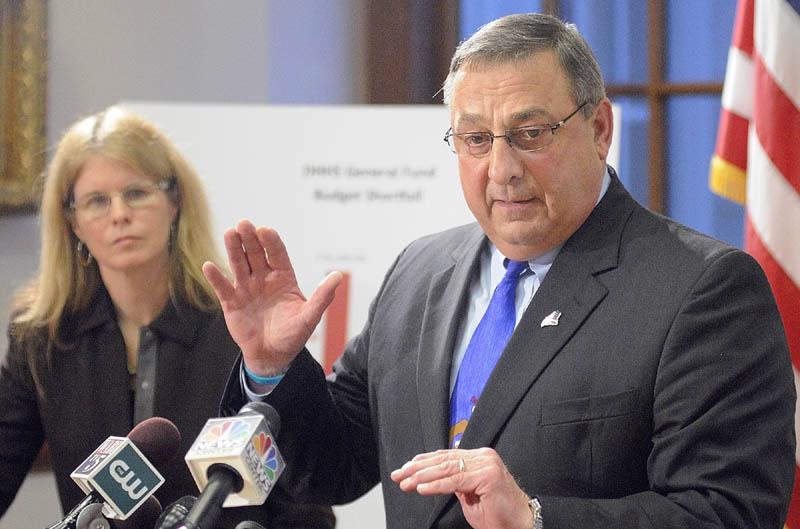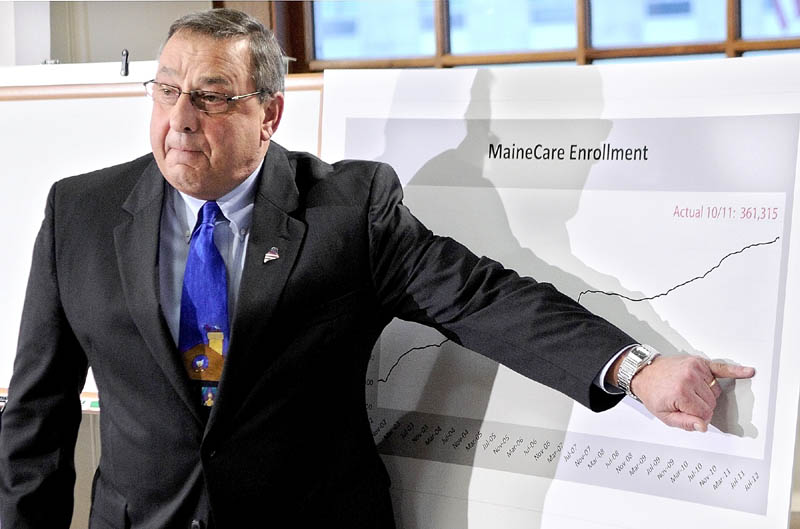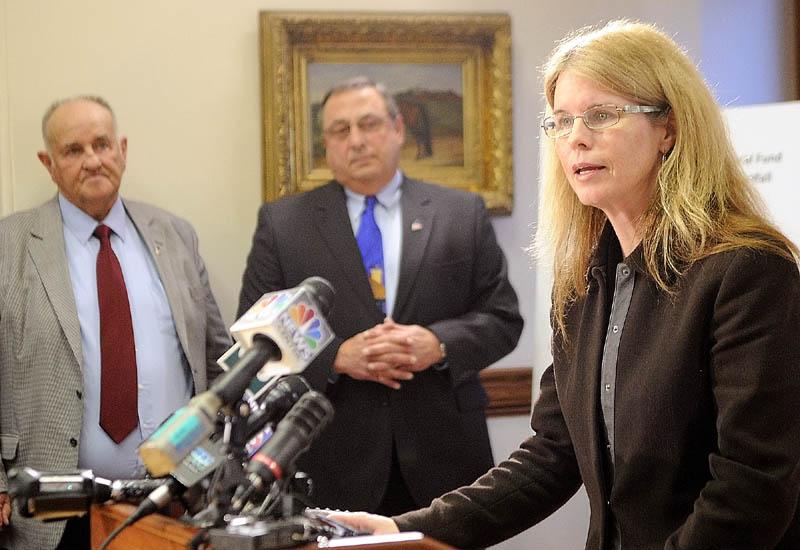AUGUSTA — Gov. Paul LePage proposed Tuesday to eliminate Medicaid coverage for 65,000 Mainers as part of a plan to cover a budget deficit that he said now totals $221 million over the next 18 months.
“I’ve asked the (legislative) leadership on both sides to please put your differences aside. … This is crisis time,” LePage said.
Democrats quickly criticized the proposal, however, saying the administration has yet to produce verified budget numbers or explain the need for such deep cuts in the state’s safety net at a time of high demand for the services.
“What has been proposed are sweeping and devastating cuts,” said Rep. Margaret Rotundo, D-Lewiston, a member of the Legislature’s Appropriations Committee. The committee is scheduled to hold hearings on the proposal Dec. 14 and 15.
LePage presented his long-awaited supplemental budget for the Department of Health and Human Services to legislative leaders and the media Tuesday.
The budget would save enough money to close a projected $120 million shortfall in the fiscal year that ends June 30 and a projected $101 million shortfall in the next fiscal year, he said.
LePage did not explain in detail why the state has overspent its budget for the DHHS. He did say that federal revenue was reduced earlier in this fiscal year and that his administration, in its first year, used some cost assumptions from past budgets.
LePage’s proposed spending cuts would affect a range of programs in the DHHS, including support for substance abuse treatment, child care, medication for senior citizens and payments to hospitals.
But the governor made it clear that he is not just trying to cover shortfalls in the current two-year budget. He is calling for a structural overhaul of Medicaid.
“This is an effort to fix it once and for all,” LePage said.
Maine’s Medicaid program, called MaineCare, now provides health insurance to 361,315 low-income and disabled residents. That’s a 78 percent increase from 2002, and a level of support that Maine cannot afford, he said.
MaineCare is a $2.5 billion-a-year program, although federal funding and other revenue cover most of the cost. MaineCare will cost the state’s general fund about $660 million this year.
Every $1 cut from state MaineCare funding would mean a $2 cut in federal funding to the state.
$66 million in savings
LePage said that cutting off about 65,000 people from MaineCare would bring Maine closer to the average state’s enrollment. It would save Maine $66 million in the next 18 months, according to the proposal.
Those who would lose coverage include:
* An estimated 19,000 low-income adults who are not disabled.
* An estimated 21,000 parents of children enrolled in MaineCare, who would not meet tighter income guidelines.
* Non-disabled 19- and 20-year-olds.
* Low-income senior citizens who qualify for MaineCare to cover a portion of their Medicare premiums.
Besides restricting access to the program, the proposal calls for saving $80 million in the next 18 months by restricting what services MaineCare covers. LePage wants to eliminate coverage for dental, chiropractic, podiatry, physical therapy and other services and clinics for sexually transmitted diseases.
The proposal also would end MaineCare support for private non-medical institutions. Such institutions include homes for the disabled and people in substance abuse treatment.
Another $36 million in savings would come from MaineCare payment reforms, such as limits on inpatient and outpatient hospital visits, a two-year limit on Suboxone treatment for drug addicts, the elimination of coverage for smoking cessation and reduced coverage of behavioral health services and mental health crisis services.
LePage said the cuts would affect many Mainers, although the administration tried to put most of the burden on healthy adults while protecting services for the elderly and disabled.
“They have not allowed me to print money yet. We have to balance the budget,” he said.
Mary Mayhew, commissioner of the DHHS, said the cuts are needed to protect the safety net for the most needy. “This is a very difficult day for all of us,” she said.
If the cuts are to take effect in April, Mayhew said, the Legislature will have to act by the end of January.
Any delay will make the shortfalls larger, she said. “We are in a financial crisis.”
Opponents: analysis needed
Democrats and advocates for Maine’s poor called the proposal extreme and potentially devastating to children, the elderly, the disabled and the poor.
They said they have yet to see a complete analysis of the budget deficit and why it has grown so quickly in recent weeks.
“We’ve been asking for the numbers for quite some time. And we don’t have them yet,” said Rotundo, the Appropriations Committee member. “I have been concerned right along that the crisis that’s been created around DHHS becomes an opportunity to cut programs (LePage) has wanted to cut already.”
Rotundo said LePage’s proposed cuts are too deep to achieve at the expense of just one program or agency.
“We think (any necessary cuts) should be done in a comprehensive way,” she said.
Critics said the cuts ultimately will not save money because people will still need health care and other services and someone will have to absorb the costs.
“All of these proposals simply shift the costs to hospitals, providers, communities, families,” said Robyn Merrill, policy analyst for Maine Equal Justice Partners.
Opponents also said the cuts would cost jobs and increase poverty.
“The financial stability of a lot of families would be put at risk,” said Garrett Martin, executive director of the Maine Center for Economic Policy.
Others support the proposal, saying Maine has been too generous with benefits for too long.
Lance Dutson, executive director of the Maine Heritage Policy Center, said the proposal would be good for the state’s economy.
“By addressing the budget shortfall with spending reductions, instead of increased taxes like past administrations have done, Gov. LePage is freeing up Maine’s businesses and entrepreneurs to invest more in growing and creating new jobs,” Dutson said in a prepared statement. “This will provide needy Mainers with more job opportunities.”
Send questions/comments to the editors.





Comments are no longer available on this story